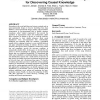Free Online Productivity Tools
i2Speak
i2Symbol
i2OCR
iTex2Img
iWeb2Print
iWeb2Shot
i2Type
iPdf2Split
iPdf2Merge
i2Bopomofo
i2Arabic
i2Style
i2Image
i2PDF
iLatex2Rtf
Sci2ools
KDD
2008
ACM
2008
ACM
Automatic identification of quasi-experimental designs for discovering causal knowledge
Researchers in the social and behavioral sciences routinely rely on quasi-experimental designs to discover knowledge from large databases. Quasi-experimental designs (QEDs) exploit fortuitous circumstances in non-experimental data to identify situations (sometimes called "natural experiments") that provide the equivalent of experimental control and randomization. QEDs allow researchers in domains as diverse as sociology, medicine, and marketing to draw reliable inferences about causal dependencies from non-experimental data. Unfortunately, identifying and exploiting QEDs has remained a painstaking manual activity, requiring researchers to scour available databases and apply substantial knowledge of statistics. However, recent advances in the expressiveness of databases, and increases in their size and complexity, provide the necessary conditions to automatically identify QEDs. In this paper, we describe the first system to discover knowledge by applying quasi-experimental de...
Data Mining | Important Causal Dependencies | KDD 2008 | QEDs Allow Researchers | Traditional Database Schema |
| Added | 30 Nov 2009 |
| Updated | 30 Nov 2009 |
| Type | Conference |
| Year | 2008 |
| Where | KDD |
| Authors | David D. Jensen, Andrew S. Fast, Brian J. Taylor, Marc E. Maier |
Comments (0)

